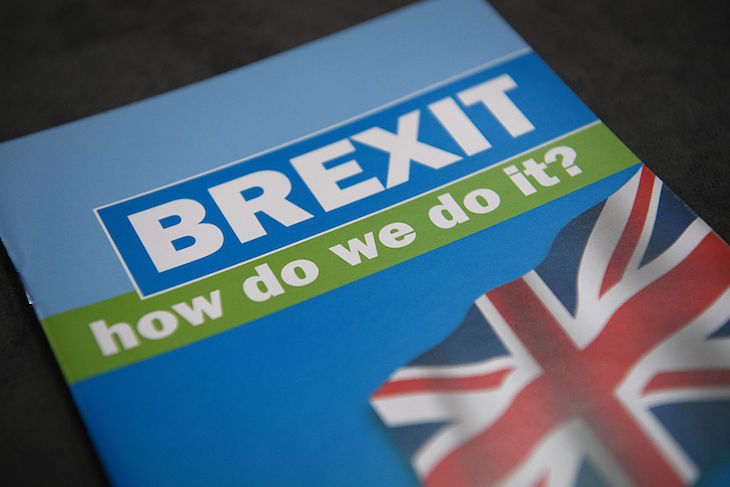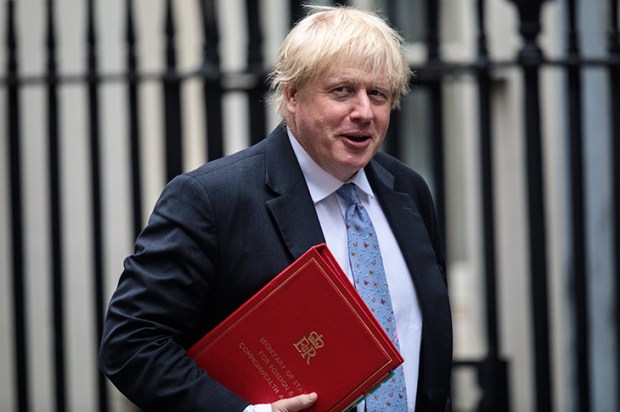The Tory party is the party of Brexit, whether it likes it or not. The referendum was called by a Tory prime minister, Tory politicians led Vote Leave and it is a Tory government that is taking Britain out of the European Union. Theresa May might equivocate when asked if she’d vote Leave in another referendum, but to the average voter, Brexit is a Tory policy.
Mrs May’s reluctance to say she’d back Brexit in another vote is revealing of a broader Conservative desire to avoid being too closely associated with the project. A classic example is Philip Hammond’s view that the £350 million a week supposedly promised to the National Health Service is Boris Johnson’s problem, not his. But ultimately, if Brexit doesn’t deliver what the public wants, it will be the whole Tory party that suffers. Few voters will bother to distinguish between those Tories who backed Remain and those who didn’t.
Delivering an orderly Brexit is existential for the Tories. If they fail to do that, their claim to be a competent party of government will be gone for a generation at least.
Given that if Brexit breaks, the Conservatives will pay the price, they should take ownership of it. They did try this at the last election, but in the wrong way. Mrs May said that she wanted an early election to strengthen her hand in the Brexit talks and to weaken the opposition parties ‘who want to stop me from getting the job done’. A few weeks later, she upped the ante, accusing the EU of trying to interfere in the election. She urged voters to let her ‘fight for Britain’.
But this bellicose rhetoric couldn’t disguise the fact that Mrs May was trying to fight an election on process, not substance. In that ill-fated campaign, there was precious little detail on what a May government wanted to do with the powers that Brexit would give it. Rather, the Prime Minister was asking voters to improve her negotiating position. But with voters none the wiser on what she would use this power to achieve, this appeal fell on deaf ears.
The right way for the Tories to take ownership of Brexit is to set out the kind of country they want Britain to be after we have left the EU. They must make clear that the Brexit they deliver will be outward-looking and future-focused. They must avoid it appearing like an act of nativism or an attempt to turn back the clock. If Brexit turns into a culture war, the Tories will find themselves caught in the crossfire. To win a majority at the next election, they’ll have to hold their Remain-voting constituencies, such as the Cities of London and Westminster. Lose this kind of seat, and it is very hard to see how the Tories could form a government.
Before the Budget, the Tories did begin to make a case for Brexit focused on the future. Philip Hammond argued that one benefit of leaving the EU would be that the UK would be free to regulate new technologies in its own way. This is a crucial point. The UK is a world leader in artificial intelligence, Fintech and driverless cars. But in all these areas, the EU’s precautionary principle could end up retarding innovation. The government should be consistently making the argument that the UK is more likely to play a leading role in these industries, which will do so much to define the next few decades, outside of the EU.
If the Tories are to define Brexit, they must have a better idea of the final deal that they are aiming for and the opportunities that will involve. For example, the government doesn’t want to commit to creating ‘free ports’, tariff-free zones that allow the easy import and re-export of goods, as it doesn’t yet know precisely what kind of customs arrangement it will have with the EU and whether free ports would be compatible with that.
But there are some things that the government could do now as an EU member that would help set the right tone. It could, for instance, take students out of the migration numbers. On her trip to China, Mrs May said that the changes she had made as home secretary to root out abuses of the system meant that international students no longer had any ‘long-term impact on the numbers’. So why not declare victory and remove students from them altogether? This would not only send a signal around the world that Brexit Britain isn’t pulling up the drawbridge but would also give a boost to this country’s university sector, which is so vital to the success of the post-Brexit economy.
As soon as the UK has left the EU, the government could vary VAT rates. Exempting a particular area from this sales tax would be a simple way to encourage both urban regeneration and keep high streets going in the face of ever more competition from internet retailers. This is a small change, but illustrative of how the UK government will have more freedom of action after Brexit.
But the Tories must be more than just the party of Brexit. No. 10 is right to identify housing and education as two areas that the party needs to concentrate on: both are crucial to social mobility. But at present Tory policy in these areas is not sufficient. Ultimately, getting enough homes built will require radical planning reform — something which Mrs May is reluctant to embrace. Like David Cameron, May suffers from representing a beautiful southern constituency with plenty of greenbelt land. Next time around, the Tories would be well advised to pick a leader whose constituency views are less attractive.
On education, the Tories have a record worth promoting. But they do need to find a way to deal with educational blackspots such as Knowsley, where there is currently no A-level provision in the entire borough.
Elections are about the future. Between now and 2022, the Tories must show the country that they are the party that knows how to take advantage of the opportunities that the coming decades will offer this country and its citizens.
Got something to add? Join the discussion and comment below.
Get 10 issues for just $10
Subscribe to The Spectator Australia today for the next 10 magazine issues, plus full online access, for just $10.
You might disagree with half of it, but you’ll enjoy reading all of it. Try your first month for free, then just $2 a week for the remainder of your first year.















Comments
Don't miss out
Join the conversation with other Spectator Australia readers. Subscribe to leave a comment.
SUBSCRIBEAlready a subscriber? Log in